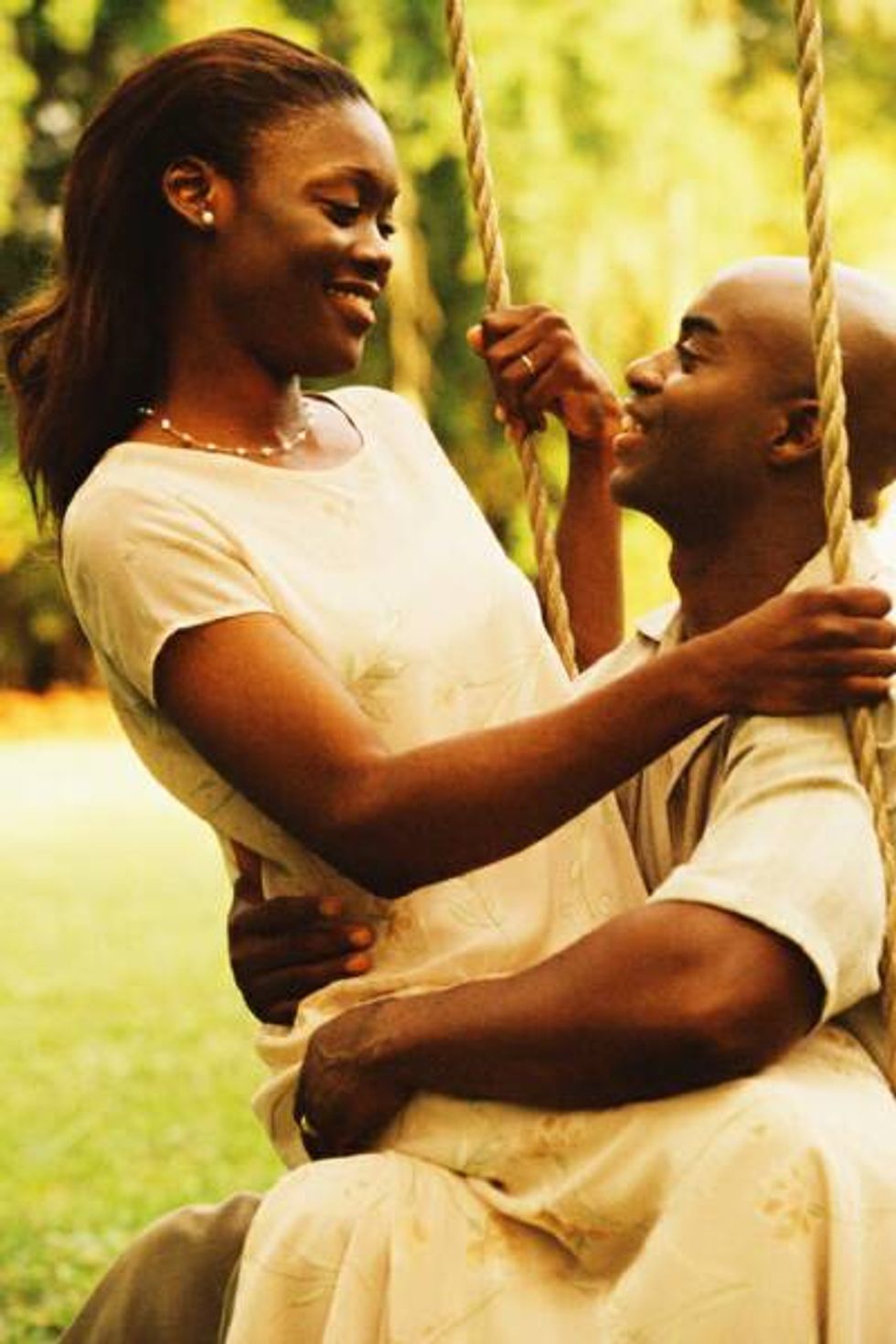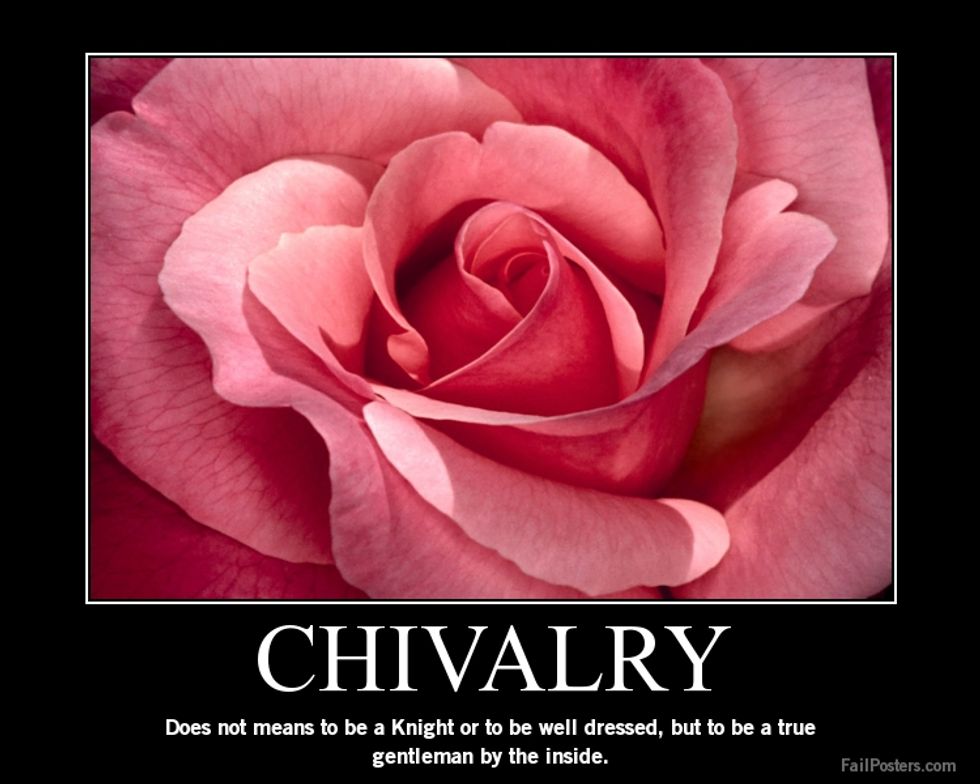“Chivalry is dead.”
“This generation of men just don’t treat women like they used to.”
We have all heard this from our parents, grandparents, aunts, uncles, and other people from previous generations. Chivalry is defined as “the combination of qualities expected of an ideal knight, especially courage, honor, courtesy, justice, and a readiness to help the weak.” However, when most people think of the phrase, they would define it as courteous behavior that men show women during the process of courtship.
As a young woman of the Millennial Generation, I have my own beliefs about courtship and chivalry, and they seem to be fairly consistent with other women. Chivalry is not common amongst our generation, however there are some young men that do practice it. Often times, when you meet a young man that is chivalrous on his own, it can be somewhat of a surprise. This is not to say that the men of our generation are rude as a whole, but there has certainly been a slight change in the idea of what men and women think is respectable when it comes to dating or our general interactions with one another.
We seem to hear about women's point of view on the topic of chivalry more often than men; therefore, I thought it would be beneficial to finally hear what men really think about it. To get a better understanding, I interviewed one man from an older generation (Guy A) and another from the Millennial Generation.
When I asked Guy A how he would define or classify chivalry, he said “I think that chivalry was a time when men would do certain things in terms of etiquette- opening doors for women, pulling out chairs for women, giving her your coat if it was seasonally appropriate, or picking up something for her if she dropped it. And anything that is heavy duty, a guy would do.” When I asked Guy B this same question, he had a similar response. “When I hear the word chivalry, I think of it in its traditional terms in how it is the idea of courting, being gentlemanlike, and doing certain things to serve your partner.”
The idea of chivalry has certainly evolved between generations. When I asked Guy A on his opinion on this evolution, he frankly stated, “I think that in some way or another, those things have been reduced because of gender equity. Guys don’t have that reflex response to help a woman now in comparison to how they did a few decades ago.” Guy B’s response was “I definitely think it has evolved, but we see chivalry in a different form. For example, in my grandfather’s generation, they were extremely mindful of being respectful, taking a woman out on a date, and meeting her parents and things of that nature. They were more careful about doing things with girls in certain stages. But I think currently it’s different, because we are so fast paced and live in the moment, so that’s why it is less common, modernly.”
While I do not believe that chivalry is completely dead, many people would disagree. When Guy A was asked if chivalry is dead, he responded by saying, “It depends on the respective parties, but I don’t think it’s dead. I actually think that people that are more involved with the church are more connected to chivalry. But no, I don’t think it’s dead when you start thinking about the specifics of it." Guy B said, “I don’t think it’s dead at all. I would say we practice it differently, but I also wouldn’t say that it is consistent with all men.”
Some men believe that a woman must behave in a certain way or have a certain relationship in order for them to be chivalrous towards them. When I asked Guy A for his thoughts he says, “I like the idea of having to be chivalrous towards all women. But there has to be a body of work, meaning that you know that person in some way. It may be your mother, your wife, or your daughter- especially your daughters when you start thinking about how you wouldn’t want men to have some misleading way of saying that they’re inferior. It’s just a demonstration of politeness- consistent politeness.” When Guy B gave his thoughts he said, “I think it probably matters somewhat. I wouldn’t say she has to be a certain way, but I do think that there are some things that she has to show in order for you to be chivalrous towards her- like if she respects herself and is concerned about her personal growth, then I think those are factors that should be considered. I also think don’t think that every female needs chivalry, because they’ll take advantage of it.”
The shift in the interaction of men and women essentially has had an effect on the practice of chivalry. When I asked Guy A about what has caused this change, he said “The appropriate assertion for women getting more identified “rights” in the same category as men. I really think that this thing about chivalry has blurred lines, but if a person has an established foundation to display chivalry, then we should." Guy B had a very different take on this notion. He says, “I think technology has played a big part of it. Like I can see you on Instagram and get an idea about how you are, or I can talk to you on Twitter and see how you interact. So in a sense, it’s almost like you’re skipping a step when it comes to getting to know someone.”
Some women do not expect chivalrous behavior because they think it is sexist. When I asked guy A if he believes chivalry is sexist, he says “Yeah. [laughs] I really do. I mean, when you start thinking about it, it's condescending, gender defining, immobilizing method of socialization- yes I do think it’s sexist.” Guy B responded by saying “Hell yeah, I think it’s extremely sexist. I think putting the expectations on guys to automatically be chivalrous is unfair. And sometimes it takes a lot for them to do certain things. I think to set requirements like that is really sexist and one-sided.”
There has been some debate over whether men or women are more responsible for the change in the practice of chivalry or if we are equally responsible. When I asked Guy A for his view on it, he frankly said, “Definitely women. I think that women have taken a lot of the burden off of men and we don’t necessarily have to be chivalrous. It’s not always necessary in the more common areas when you meet and greet someone. There was a time when you would greet a woman and you would give a nod of the head. But now you can actually shake their head. That may not necessarily be chivalry, but I’m just saying that the demands are not entirely on the man when it comes to being a chivalrous person anymore.” When I asked Guy B for his opinion he also said that women are responsible. He stated, “I feel that you decide on what you tolerate, and you accept what is given to you. So if you don’t question, challenge, or try to upgrade what you’re receiving, then of course you’re going to get lower and lower standards. Which means that you are going to see less and less chivalry from our generation. So I think women are the reason why chivalry has declined.”
It seems as if that some men’s views on chivalry are fairly similar. Their opinions on the surface seem to intersect; however, their reasoning behind their opinions contrast.
A new idea that I gained from this is that men believe that women are responsible for the decline in chivalry, which is the opposite of what many women believe. Essentially, chivalry is an idea that we must demand from a man, instead of automatically expecting it. Chivalry is not dead, it is simply something that must be requested, nurtured, and appreciated if it is really what you expect.








 Going to the cinema alone is good for your mental health, says science
Going to the cinema alone is good for your mental health, says science












 women in street dancing
Photo by
women in street dancing
Photo by  man and woman standing in front of louver door
Photo by
man and woman standing in front of louver door
Photo by  man in black t-shirt holding coca cola bottle
Photo by
man in black t-shirt holding coca cola bottle
Photo by  red and white coca cola signage
Photo by
red and white coca cola signage
Photo by  man holding luggage photo
Photo by
man holding luggage photo
Photo by  topless boy in blue denim jeans riding red bicycle during daytime
Photo by
topless boy in blue denim jeans riding red bicycle during daytime
Photo by  trust spelled with wooden letter blocks on a table
Photo by
trust spelled with wooden letter blocks on a table
Photo by  Everyone is Welcome signage
Photo by
Everyone is Welcome signage
Photo by  man with cap and background with red and pink wall l
Photo by
man with cap and background with red and pink wall l
Photo by  difficult roads lead to beautiful destinations desk decor
Photo by
difficult roads lead to beautiful destinations desk decor
Photo by  photography of woman pointing her finger near an man
Photo by
photography of woman pointing her finger near an man
Photo by  closeup photography of woman smiling
Photo by
closeup photography of woman smiling
Photo by  a man doing a trick on a skateboard
Photo by
a man doing a trick on a skateboard
Photo by  two men
two men  running man on bridge
Photo by
running man on bridge
Photo by  orange white and black bag
Photo by
orange white and black bag
Photo by  girl sitting on gray rocks
Photo by
girl sitting on gray rocks
Photo by  assorted-color painted wall with painting materials
Photo by
assorted-color painted wall with painting materials
Photo by  three women sitting on brown wooden bench
Photo by
three women sitting on brown wooden bench
Photo by 
 Photo by
Photo by  Photo by
Photo by  Photo by
Photo by  Photo by
Photo by 


 people sitting on chair in front of computer
people sitting on chair in front of computer











